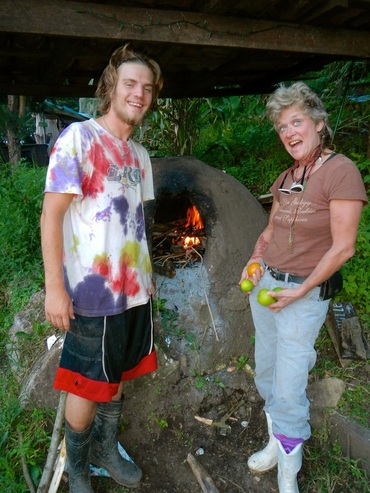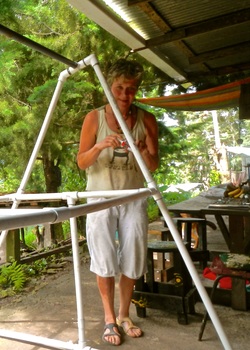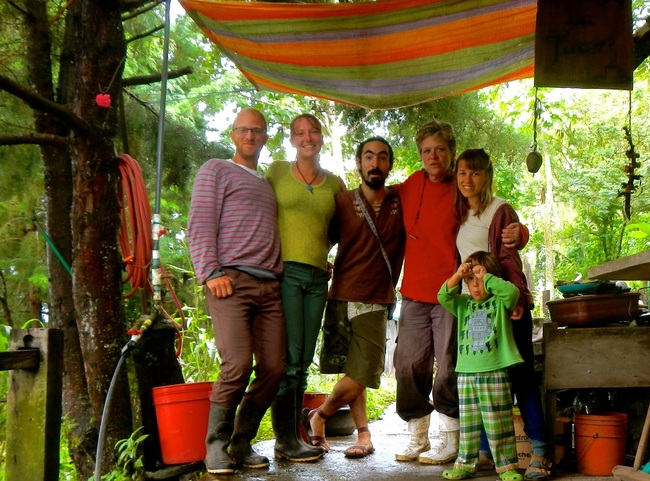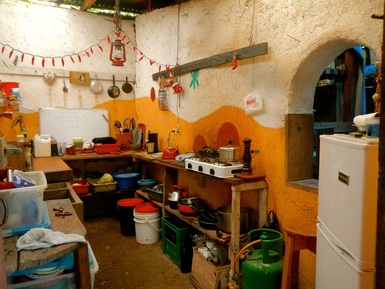 Michael (volunteer) and Suzanne with Biofera's cobb oven
Michael (volunteer) and Suzanne with Biofera's cobb oven Suzanne, whom we discovered at a volunteer-supported mountain retreat in northern Nicaragua, is a former Marine, cancer survivor, and peace communications innovator now engaged in an independent forest preservation and clean water initiative on 20-acres of property she purchased near Jinotega, Nicaragua. She bought the land in 2000 (without actually seeing it first), after finding that the price was right, it contained a water source, had good, fertile soil and was near a highway. Her project, which she's named "La Biosfera Reserve & Retreat", is an awesome spot where we spent a week as volunteers in October 2013. "Biosfera" (Spanish for biosphere), Suzanne says, "refers to the layer of the earth above the lithosphere, or the rock layer under the dirt and clay, through the space we breathe including gurgling brooks and mighty trees, up to around 10 km into the atmosphere. It is the place of our most intense human-nature interaction, and most rewarding scientific discovery. Now, many reserves have added it to their name - the Big Lungs - The Amazon Biosphere, Reserva de la Biosfera Bosawas, etc… It seems a little silly to call this tiny place simply La Biosfera as if it were the Be-All and End-All of forest protection," she says, pausing, "La Biosferita, maybe," and laughs.
As a U.S. Marine in the 1980s, Suzanne spent a lot of time working in communications and on the project which was precursor to the Internet, “the Wanderer” - the name she continues to use to reference the Web, alternately with "the Ether." A crypto-analyst principally tasked with monitoring and analyzing Soviet & Cuban maritime activity, she detected movement which led her to believe that the Russians were building an underwater hydro-acoustic (submarine detection) array, with the potential to be weaponized – YIKES! After reporting her findings to Naval commanders, she was told to turn a blind eye and move on. Recognizing that the risks of reporting the matter were far less than those associated with not doing so, Suzanne learned of, and was advised to use, a certain “hunch report” that could be used to detail what was now known to Fort Meade's Puzzle Palace (a nickname for the U.S. National Security Agency). Her actions nearly earned her a Court Martial (the system the military uses to try cases of violation of authority) from the local Naval Commanders, but kudos from NSA. Having lost their bid for her demotion, Suzanne's commanders sent her to Guantanamo Bay, Cuba where she spent her twilight tour on air defense analysis and, in her free time, exploring the local coral reef and tinkering with an old motorcycle purchased there, a 1966 International Scout called "Molotov" for its rag gas cap (parts were scarce) that she shared with her fellow Marines for beach and sport. She reports that water was so scarce there, "Gtmo's" Golf Course was one of just two courses in the world you could lose a ball in the fairway and replace it without the loss of a stroke.
Upon termination of her nine years in the service, Suzanne was informed that the results of a Pap smear and breast exam taken nine months earlier were both positive for cancer. She opted for a natural and spiritual cure, and spent some healing time on the border to Mexico at Nogales. Later, she moved to the East Coast to study and work on advocacy and peace policy communications. With some success in these, principally at the United States Institute of Peace, she moved on in 2004 to research issues of post-war development in Nicaragua. "It's been like three phases - War, Peace and Development." Suzanne says, "Nicaragua had gained the Peace, it was a great place to give it a shot." Her lack of development experience and her time in the Marines prohibited her entry into development and humanitarian organizations, so her model was self-designed.
 Suzanne helping to glue the coop
Suzanne helping to glue the coop While she set about correcting the water problem, she closed the doors on Naturalí and donated her remaining plastic bottles to a Narcotics Anonymous center that bottles detergents, which in turn sent her people to help dig and fill dirt bags for an earthbag lodge. She connected neighbours to the water and implemented techniques to improve the watershed. One neighbour pays by providing weekly laundry services, another with eggs or cash or technical assistance, and the northern neighbour receives her water free, in exchange for "threats and sabotage." There are official plans to exploit a large lower basin on La Biosfera for the adjacent valley settlement below, and it receives its water currently through self-run hoses.
 Suzanne with a gang of volunteers
Suzanne with a gang of volunteers  Looking into Biosfera's kitchen
Looking into Biosfera's kitchen Suzanne is one of the most genuinely interesting people we have met. She is full of fascinating stories about her time in the Marines, her battle with cancer, her time living in Nicaragua and about life in general. She is very passionate about peace, environmental issues, waste, water and healing. We found her lifestyle to be extremely generous and inspiring. Her selfless efforts to preserve the land and educate the local community as well as visitors like us have resulted in her teetering on the edge of the extreme poverty line, though she feels fulfillment in her legacy and intends to continue on." Her next big projects will be increased re-forestation around her land, continued strengthening of the watershed, and expanded community relations in events around performance art and ecological education. Hopefully others in the community will look to what she has done and learn to appreciate nature much more. "You can't do things in a developing nation normatively - 'this is how it ought to be done.' Better, Build it and they will come. If they don't, Fear Not. Others' apathy or distractions do not, by extension, become ours. Bonus, that the conscious, and conscientious Family is growing, and maybe exponentially - who knows, the known ether could connect with the cosmic one."
Interview
For awhile, it was the retreat from the maddening crowd to pursue a Good, in a place unique for its Peace but with a rogue leftist mentality. Then I found another crowd probably more mad than the last, and difficult conditions, so it became the off-road motorcycle escapes and wild places for a short time there. Later it became that of diving into a service project that I knew to be consistent with a latent national vision; then it was discovering some co-conspirators like Abram on the Coast, Sorcha & Antonio del Cerro Azul, Marienela de Brazil, Carlos of Honduras-LA, Horusmac of Quintana Roo. The Nicaraguan people have always been a constant - a lovable conundrum of great capacity and petty audacity. I have always felt free to express myself, although I have been accused of, and believed to be (small town, big hell, or Pueblo Pequeño, Infierno Grande, as they say) every kind of pendejo (asshole or jackass) there is. Few people really understand frankness, the kind that gets to the point to get the job done, or a good work ethic. So perhaps it could be said that my favorite part has been the opportunity to challenge my belief system on nearly every level, and utilize it transformatively. Also, the degree of non-material freedom has been a bonus, though I can't say there hasn't been a little "ayudita" from like-minded folks, from time to time, when traffic is slow. The psychological benefit of having a Coming Together place ranks top.
What do you miss most about living in the US?
The U.S. is a classless society. If someone puts on "Do you know who I am?!" airs, she gets laughed out of the ballroom, or bowling alley. Latin America is nostalgic for any part of classism that hasn't gone out kicking and screaming bloody murder, and clings jealously and ridiculously to whatever semblance of social (predominantly socio-political) pecking order that remains. Nicaragua's theatre in this regard is astonishing really, given its protracted struggle with it. Also there is a lot of game playing in social constructs that I still have a hard time penetrating. And the international media penetrates in strange ways. So I guess I miss most the generally accepted human validity (this may except foreign countries' peeps, Americans can be a bit shameless in its country stereotypes) in the U.S. among chance strangers and by extension the rallying for a cause, the good neighbor ethic, the vibrant civil society, the generally good work ethic, the privilege to speak frankly or stay quiet. Also, pickles, olives, grapes, sourdough pretzels and the pleasing range of great cheeses and draught beers, great wines. I will soon produce what I can of these, and the "necessary" za'atar, horseradish, curries, and sun-dried tomatoes, plus hopefully a fish pond and a smokehouse. I am from Buffalo, NY: The City with the Most Heart. Good eats and good neighbors. Seems a small thing, but it is really Great, really.
What do you think is the most important resource for humans on this planet, and how do you think we should use it?
The Mind! Liberally yet Carefully but not Sparingly. There is balance in natural resources and potential, proper human use of them that I am reluctant to pick any one over another. And if one's mind is not used to much analyses, just think: If it doesn't work, make adjustments, and if that doesn't, shift, only the Self, accessed through the Mind, can understand the necessary shift.
Why do you think there is war and violence in so many parts of the world? And how do you think we can overcome it?
Resources, Religion, Spin and quite likely a Poisoned Food Supply, it is no secret; to be overcome with Religion-free Spirituality, Truth or Honesty as best as we can know it or show it, and a co-Creative existence with Nature. This is no secret either. And if we MUST continue with this festering canker sore called government, at least until an evolved collective can dismantle it, we will have to search for and select leaders who will excel on our behalf, and naturally of the type that do not seek political office.
Such a big, massive, tragic question! We've been at this a long time. We're primitives on the edge of Discovery. Thank Zeus, et al, that there were a few aliens among us, en route. War? It's cuz wir stupit!
I don't think there is a lot of Spirituality in a world where mass, live graves are still possible, or the vast destruction of pristine forests, or laws enacted for the pretext of the common good but which continue our self destruction, or where we systematically poison the last two percent of potable water on the planet, or where people are authorized by their religions and political parties to kill a. others, b. themselves, and c. the will of many to question order whether dogmatized by the centuries, misinterpreted by the holiest of earthbound holies, or that which is catalyzed by current events, likewise misinterpreted internationally or otherwise.
Soldiers that come Home from meritorious or otherwise faithful service to such shocking Disconnect that they opt for suicide is one of our great modern tragedies. (To those who disparage soldiering in all cases, suspend your disbelief or hold your horses…) If a human bean enters the war count, whether by forced or voluntary means, or whether for Warrior-class curiosity, altruistic-patriotic reasons, pragmatic-educative, club-membership, between-war-rearguard discipline, media-stereotype-kill driven, or Nintendo-like transition to adulthood without loss of youthful adrenalin (bang-bang!), his experience will always change him, for better or for worse. If for better it is often in pursuit of dismantling that faulty military mechanism from within or without; and if for the Worse, well, we are witnessing with these suicides (and mass homicides by soldiers indeed), its manifestation in cataclysmic proportions.
Religious systems and governments separate Good from Evil and compel people to create external enemies. Nor are corporations centers of excellence with regards to the value of a human life. What lacks is Collective Will, the Global Village, all that. We have the Technology! It is a daunting task but cosmic shifts are creating conditions for a new consciousness that is collectivizing. We could all start by taking a deep breath and clearing our heads. Perhaps an actionable item to address it would be worldwide opposition of the draft and voluntary military service, for starters.
What is your opinion on cancer treatment options in North America? And when do you think natural remedies could be sought/effective?
I went rather full circle on this. I believed my oldest brother died from anger and chemotherapy complications, so I sought inner peace and alternative healing, which resulted well for me. Joey pretty much saved my life, the grumpy fuck. I pursued additional therapies after healing because self-control or self-realization of your health, your life indeed, is a powerful paradigm, a lost ancient art it might be said. However, there are cases in which some chemotherapy could be warranted. But no part of these alternative therapies need to conflict with the regimen; and the objective would be to free oneself of them immediately upon discovering an inner or alternate capacity to address the cure. If diet, addictions, malaise, tradition, and/or a contaminated biosphere are killing you - SHIFT!
What do you think is the meaning of life?
Another biggy. I am not sure but my best guess is Pi. If the more narrow interpretation of "meaning" is "definition," then my answer would be The Privilege to Breathe for Awhile and then Quit. If it is, rather, "purpose," then I'd say To Give Meaning to that Breath.
Who are the coolest non-French Canadians that you met in October 2013?
Undoubtedly you two are the happiest and cleverest non-Quebecois Canucks I have seen in a LONG time. And such a handsome couple, so funny, and smart! If each successive generation represents our evolution, you make me feel like we old farts have done our job.
 RSS Feed
RSS Feed